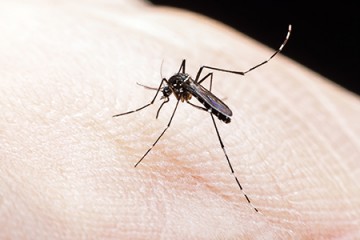As the number of patients with Zika virus grows worldwide, Johns Hopkins Medicine today announced the opening of the new Johns Hopkins Wilmer Zika Center dedicated primarily to caring for patients with the mosquito-borne and sexually transmitted virus.
The center is composed of providers and staff from departments and divisions at Johns Hopkins Medicine and the Bloomberg School of Public Health, including epidemiology, infectious diseases, maternal-fetal medicine, ophthalmology, orthopaedics, pediatrics, physiotherapy, psychiatry, and social work. Medical experts from Brazil, a country greatly affected by Zika virus, are also members of the center.
"Patients will no longer be required to travel to multiple centers for care relating to Zika virus," says William May, associate professor of ophthalmology at the Johns Hopkins Wilmer Eye Institute. "Physicians and staff members in various departments at Johns Hopkins will be available to provide comprehensive care to patients within one institution."
Infections from Zika virus have reached epidemic proportions in parts of the world in the past year, with Brazil being the epicenter of the outbreak. Several non-travel-related cases have recently been reported in Florida, suggesting local transmission there. According to the World Health Organization, Zika may be responsible for thousands of babies being born with microcephaly, a severe birth defect that affects the brain, and for some adults experiencing neurological symptoms.
The Wilmer Eye Institute led the development of what is believed to be the first such comprehensive and multidisciplinary Zika center. In addition to microcephaly, Zika is also reported to cause eye abnormalities in up to more than half of babies infected with the illness, according to a recent study in Brazil. The Wilmer Eye Institute is able to diagnose and, in many cases, treat eye concerns associated with Zika virus—including cataracts and other vision issues—with specialized technology.
Adult and pediatric patients worldwide can be referred to the center by outside physicians or through Johns Hopkins departments and divisions, including emergency medicine and maternal-fetal medicine. Patients can also call the Wilmer Eye Institute to schedule an appointment. A case manager will work with patients to develop a care plan and identify specialists with whom the patient should follow up.
"When a patient, particularly a pregnant woman, contracts Zika virus, it can be a tremendously alarming experience," says Jeanne Sheffield, director of maternal-fetal medicine for the Johns Hopkins Hospital. "Our team will be able to coordinate our efforts to determine patients' needs and provide the best care possible."
The Zika center team will also be involved in research to learn more about the virus, about which many unknowns still exist.
"Our No. 1 priority will be focused on our patients," May says, "but our hope is that our care will also lead to many new developments in the effort to fight this potentially devastating disease."
Posted in Health, University News
Tagged public health, epidemiology, wilmer eye institute, zika virus










